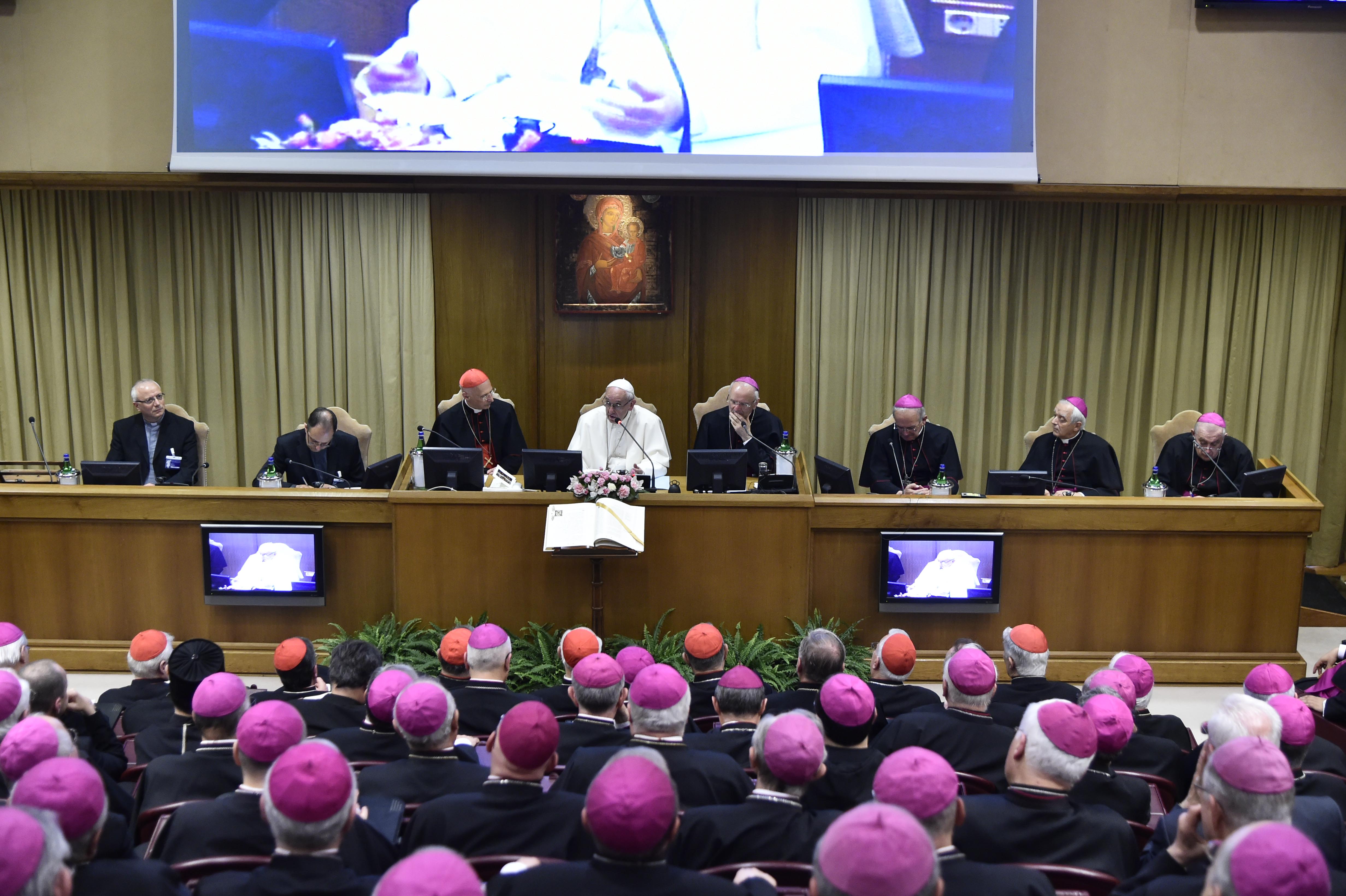CEI Assembly
A speech meant for a later moment, which turned into an intimate form of meditation at the end of a close, “involving” encounter, whereby the election of the new President of the Italian Bishops’ Conference (CEI) must be lived as a “sign of love for the Holy Mother Church, a love lived out with spiritual and pastoral discernment, according to a synthesis which in itself is a gift of the Spirit.”

Pope Francis did not read the “meditation” meant to open the 70th CEI General Assembly. He said he had written it as a service to help the Conference “progress and deliver more fruits”. He prepared it to be read and reflected upon by every bishop at the end of the meeting. After a few remarks in which he thanked Cardinal Bagnasco, followed by an exhortation to undertake sincere and open dialogue, the Holy Father introduced a dynamics whereby “synodal breath and pace reveal what we are along with the dynamism of communion that animates our decisions.” In reading the meditation we are about to comment upon, it’s important to bear in mind the gesture called upon by Francis, namely:
a step of collegiality, being open to listen to the brothers in the episcopate, including “unpleasant opinions.”
We ought to acknowledge the Holy Father’s joyful mood and his faith in the Spirit, as he invites the bishops to speak out before handing them the text of his speech. The address, or meditation, is divided into five invocations to the Holy Spirit. In the first invocation he asks the Spirit to donate the primary gift, which consists – the Pope wrote – in “convening in unum, willing to share time, moments of listening, creativity and consolation”. Within this spiritual realm of collegiality ushered in by Francis, which he invites to replicate in every particular Church, we find the second invocation to the Holy Spirit, aimed at illuminating our hearts. The “gentle persuader of the interior man” is invoked to “visit” his Church. Here the Pope invites to meditate on the Letter to the Seven Churches in Revelation, which he describes as “the great book of Christian hope”, consisting in are a set of points for pastoral examination of conscience, with the gaze aimed at discerning what the Spirit “wants to cure” in his Church.
The purpose of reproaches, said the Holy Father, is never to depress us or linger over, since “they are born of love and lead to love.”
The tone of Revelation is extremely appropriate, for it incorporates the wisdom that mixes “sweetness-saltness-sweetness.” Two quotations – one from Paul VI’s address at the opening of the second session of the Second Vatican Council, and another by D. Bonhoeffer – embrace all that needs to be purified with deep hope. With Paul VI the Pope restores to the Assembly “the love, the freshness and the enthusiasm” of Vatican II as a foundation that is near, whence can be recovered the consolation of the original love, which the Church of Ephesus made us dampen. Quoting from Lutheran martyr Bonhoeffer and his appeal not to relinquish a grace given to us at “dear price” with attitudes of “compromise, calculated indecision and the snare of ambiguity”, the Pope exhorts the Italian Church to let herself be “shaken, purified and consoled.”
Along the way we are exposed to the temptation of “tiredness”, of “spiritual worldliness”, of the lack of “concreteness”, of “appearance”, to which the Spirit responds with “God’s surprising initiative”, through “God’s gaze present in so many humiliated brothers”, through “Jesus’ feelings and (concrete) gestures”, and through Christian coherence.
The dynamics of the meditation place these temptations and graces under the action of the Spirit. To the Holy Spirit the Pope addresses his supplication: “Wash away whatever is sordid, soak whatever is arid, heal whatever bleeds. Bend whatever is rigid, warm whatever is cold, straighten whatever has drifted.” The last two graces asked by the Pope, that he calls upon the shepherds to ask, are the grace of discernment and the grace of pastoral charity. The Pope highlights the discernment of the “time of grace” (kairos) that we are living, which the bishops “have the responsibility to recognize, to receive and to second with docility.” The invitation to pastoral charity to “feed the Church of God” with the “compassion of the merciful Father” and with “a strong and generous spirit” appeals to the intercession of Pope Francis’ beloved Saint Therese of the Child Jesus, who said: “love alone makes the members of the Church act.” For himself, the Holy Father asks to pray, as always, to accomplish his mission “in full” “with you and for you.” The meditation ends with a final invocation to the Spirit: ““Come, Holy Spirit. Give us virtue and reward, give us a holy death, give us eternal joy.” Amen. A speech, which although meant for a later moment, turned into an intimate form of meditation at the end of a close, “involving” encounter, whereby the election of the new President of the Italian Bishops’ Conference (CEI) must be lived as a “sign of love for the Holy Mother Church, a love lived out with spiritual and pastoral discernment, according to a synthesis which in itself is a gift of the Spirit.”